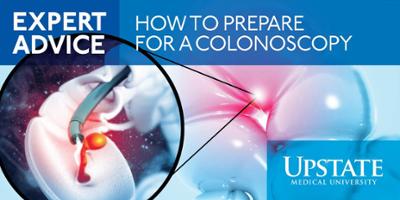
When do you need a colonoscopy, and what preparation is required?
Transcript
Host Amber Smith: Upstate Medical University in Syracuse, New York, invites you to be The Informed Patient with the podcast that features experts from Central New York's only academic medical center.
I'm your host, Amber Smith.
Many people who have undergone a colonoscopy say the preparation for the test, which screens for colon cancer, was worse by far than the test itself. But there are new methods available today that may make a dreaded task more bearable. Here to tell us about them is Dr. Kristina Go. She's an assistant professor of surgery at Upstate specializing in colon and rectal surgery.
Welcome back to "The Informed Patient," Dr. Go.
Kristina Go, MD: Hi. Nice to be here today.
Host Amber Smith: I understand that in order to visualize the colon through the camera that you use, doctors need the colon to be empty and clean, but why is it such an onerous task to clean out the colon?
Kristina Go, MD: When we're doing a colonoscopy, I really want to look at the inner lining of the colon, called the muccosa. And so in order for a patient to have a clean colon, they literally need to flush out any kind of solid and liquid waste, so that we can see the clean inside area.
Host Amber Smith: From the time we ingest food, how long does it take to make its way through the gastrointestinal tract?
Kristina Go, MD: The short answer is that it depends, both on the individual and sometimes it can even be variable within the same person. So, on average, we say in a non-constipated patient that transit time solely through the colon can take about 30 to 40 hours, and even going to 72 to 100 hours can still be considered normal in a patient, depending on any associated symptoms they might have. Now, when I say that it can be variable in the same patient, that can be based on how much physical activity they've had in the day, what kind of foods they've had during the course of the day, whether it be more processed foods or more fluid and more whole grains. And from patient to patient, it can also be dependent on any kind of medicines or underlying medical conditions they might have.
Host Amber Smith: Do fluids, in general, move more quickly through the system?
Kristina Go, MD: They do. They do.
Host Amber Smith: Well, I'd like to ask you about the colonoscopy before we get into the details of prepping. So, you're looking at the lining, and you're looking for polyps?
Can you explain to us what polyps are and what they look like?
Kristina Go, MD: Sure. When I have a patient in my office asking about colonoscopies or other colorectal cancer screenings, when we talk about polyps, really they're clumps of abnormal cells on that mucosal lining of the colon that I was talking to you about.
So in a normal colon, the inside lining is nice and smooth and you can see the underlying blood vessels, and it can even look pretty shiny during a colonoscopy.
When I see a polyp, they usually look like little bumps, or they can almost look like little mushrooms whenever we're doing the scope.
So, what I tell patients are polyps are abnormal clumps of cells. They can either have the potential to grow into a cancer, which is why we get very excited about doing colonoscopies, to prevent them from turning into cancer.
But then on the other hand, you have some polyps that never turn into a cancer, and we still won't understand that until we remove it from a patient's colon.
Host Amber Smith: So, every polyp has to come out?
Kristina Go, MD: Generally speaking. I wouldn't say that every polyp has to come out, but experience and expertise can let us know which polyps look more suspicious. That's generally based on what kind of size it is, and what the appearance is.
Host Amber Smith: Are there other things that you might discover during a colonoscopy?
Kristina Go, MD: Yeah. So, I have patients who undergo colonoscopies, not just for colon, and rectal cancer screening or polyp removal. Sometimes they might have diarrhea that isn't explained for other reasons, and we're trying to find that out. I can also see small outpouchings in the colon called diverticula, which could be a whole other talk in and of itself.
I have patients who have inflammation of the colon that we don't really know why, and they might have an underlying condition called inflammatory bowel disease, either in the form of ulcerative colitis or Crohn's disease.
Host Amber Smith: Now, during this procedure, the patient's anesthetized to some degree, is that right?
Kristina Go, MD: That's right. Generally speaking, most patients either undergo something called moderate sedation, where they get certain types of medications, so they're really just mildly still awake and aware of what's going on. They can also undergo something called monitored anesthesia care, where an anesthesia team is still providing them with a special type of medicine called propofol, but it does require some additional expert care during that time. And depending on the patient and maybe their underlying medical conditions, some patients actually need general anesthesia for their colonoscopy.
Host Amber Smith: Now, what are the current recommendations for who needs colonoscopies and how often?
Kristina Go, MD: That's a really interesting source of conversation right now. Currently in the United States, we have several different medical societies that recommend that an average-risk patient get colon cancer screening starting at the age of 45. Now in the setting of colonoscopies, if no abnormalities are seen, that doesn't need to be repeated for up to 10 years.
And those societies include the U.S. Preventative Services Task Force, the American College of Gastroenterology, as well as the American Society of Colon and Rectal Surgeons.
Host Amber Smith: And what makes somebody average risk or how would I know whether my risk is average or not?
Kristina Go, MD: When I'm talking to my patients, certain questions I ask include, do you have a family history? So, do any of your biologic relatives have a family history of colon or rectal cancer or any kind of large polyp burden? I also ask the patient if they've had any personal history of polyps from their previous colonoscopies, or if they've had a history of colon or rectal cancer. And then, going back to what we talked about before, if they have a history of inflammatory bowel disease, ulcerative colitis, or Crohn's, that also changes what kind of risk factors I think about.
Host Amber Smith: This is Upstate's "The Informed Patient" podcast, with our guest. Dr. Kristina Go. She's a surgeon at Upstate who specializes in surgery of the colon and rectum. And we've been talking about colonoscopies.
So let's talk about the prepping for the colonoscopy. Do I understand correctly that people used to clean out their colons over several days, using laxatives, such as castor oil or magnesium citrate, before they could have this test?
Kristina Go, MD: That's certainly true. And sometimes that's still true to this day, depending on what kind of prep quality a patient has had in the past. We don't use castor oil, as one of the FDA-approved medications. Magnesium citrate is still a laxative that is often used, not necessarily for bowel prep, but for othersources in the colon and rectal world.
Host Amber Smith: Have most patients had to drink a special beverage, that is not known to taste very good, to clean out the colon the day before? Is that typically how it's done?
Kristina Go, MD: The most common bowel prep: You might hear it called GoLytely. It's a polyethylene glycol-based solution, and the most common one is a 4-liter prep that you start drinking usually the day before and often the morning of your colonoscopy.
Host Amber Smith: And then why is drinking a bunch of water along with that part of the prep?
Kristina Go, MD: There's a couple of reasons for that, even if you're taking a lower-volume prep. No. 1, the whole purpose of a bowel prep is to completely clean out your colon. In no euphemistic terms it's really just having a lot of severe diarrhea for the day before, while you're drinking your prep.
So drinking water or fluids keeps you hydrated and can also decrease the symptoms of nausea that can be associated with this type of prep.
Host Amber Smith: The FDA approved a pill called Sutab last year. Is that an option for patients who can't stomach the taste of the GoLytely?
Kristina Go, MD: It is definitely something that is available, and that I often prescribe to my patients.
A lot of the times when you are thinking about a bowel prep, or when I'm thinking about bowel prep, I think about a couple of things. No. 1, is it something that a patient can tolerate? No. 2, what is the side-effect profile on these preps? Is it safe for all of my patient population or only certain patient populations?
And then lastly, but I think it's still important, is really the cost of any kind of prep that I'm prescribing to a patient. So Sutab is certainly very effective bowel prep, and that's been shown in certain studies, but it can be cost prohibitive if your insurance doesn't cover it. And so that's also something that we take into account when prescribing these things.
Host Amber Smith: So how does the pill work? Does it do the same thing that the GoLytely does? And is it as effective?
Kristina Go, MD: It's definitely just as effective, and it has a similar what we call mechanism of action as the GoLytely. So both GoLytely and Sutab are what we call osmotic laxatives. So what that really means is that it works by causing water to stay within the colon and be retained in the stool.
And so if you have a lot of fluid in there, you're really giving yourself diarrhea, but for the purposes of cleaning out a colon, it's very effective.
Host Amber Smith: What is your preferred method?
Kristina Go, MD: I generally have patients do a lower-volume source, similar to GoLytely. I use something called MiraLax. It's a flavorless powder, and I ask my patients to dilute it in any kind of Gatorade or clear liquid of their choice, so long as it lacks any red or purple food coloring. And then I ask them to basically drink that for about every 15 minutes until 64 ounces of it is gone.
The other part of that prep is that a patient needs to drink clear liquids, as in nothing that is opaque, nothing with any kind of solid components to it, for the entire day before the day of their colonoscopy.
Host Amber Smith: You mentioned the red and the purple. Why do you have to avoid those before the colonoscopy?
Kristina Go, MD: That can definitely change, how the mucosa looks. The inside lining of our colon is a pink color, so that can have the potential of distorting what I see on a colonoscopy.
Host Amber Smith: Other than the bowel prep itself, how do you tell patients to prepare for their exam? Is there any other advice you have?
Kristina Go, MD: Yeah, so in terms of trying to tolerate this amount of liquid that you're having to drink, I give patients some pointers. Some of them work better than others.
So, placing your prep on ice or drinking it through a straw can sometimes decrease how unpalatable the flavor of the prep is.
Sucking on lemon slices or sugar-free menthol candy drops can also decrease that feeling of nausea. And while the instructions on the container of a large-volume prep might say that you need to drink basically a glass every 15 minutes until you're done, that can make patients feel pretty bloated or nauseous. So what I counsel them is, if you're starting to feel a little bit full or unwell, it's certainly OK to space out how quickly you're drinking all of that prep.
Host Amber Smith: Is there anything different that people need to do if they're chronically constipated?
Kristina Go, MD: Sometimes I recommend that they drink clear liquids for more than just the 24 hours. If a patient has told me that they have chronic constipation, or if they've had a poor prep in the past, that might change either the type of prep that I give them, or, unfortunately, I might recommend that they do a two-day instead of a one-day prep, all the better to just get it done and have a good colonoscopy versus being told you have to do it all over again within three to six weeks or so.
Host Amber Smith: Do you have any dietary advice for the week leading up to the colonoscopy? Is there anything that people should eat or should avoid?
Kristina Go, MD: I do tell them, even though it hasn't been really backed up by the literature, that they really should avoid any kind of high-fiber, high-residue diets, so exactly the opposite of advice I tell patients in terms of their colon health I tell them to follow during a colonoscopy prep. So, trying to avoid those great, leafy green vegetables and maybe the Metamucil or other types of fiber supplementation that I generally tell patients to take, I tell them to avoid in the week preceding their colonoscopy.
Host Amber Smith: That's interesting. So after the colonoscopy, you go back to the healthier, high-fiber diet, but to prep for it, that's the opposite.
Kristina Go, MD: Exactly.
Host Amber Smith: Well, before we wrap up, can you tell us about colonoscopy alternatives? Are stool-based tests a reliable way to catch colorectal cancer early?
Kristina Go, MD: Certainly. We have a couple of stool-based studies, and what I tell patients when they're exploring non-colonoscopic avenues for colorectal cancer screening is, well, they're certainly an alternative, but if any of these are positive, you still need to get a colonoscopy. So let me preface by saying that in terms of the stool-based tests out there, several fall in the category of just looking for blood in your GI (gastrointestinal) tract.
And so if they're not particularly specific, they might let us know that you have an underlying colon cancer. One of the newer tests looks at the DNA in the stools, called Cologuard. You might have heard of it on commercials. And that actually has a pretty good accuracy in letting us know if there's any underlying colon cancer.
However, it's not as good at allowing us to know whether or not you have polyps in your colon. And again, if any of these are positive, you still need to follow up with a colonoscopy.
Host Amber Smith: What about virtual colonoscopies? Would that be an option for everybody?
Kristina Go, MD: It is an option. Sometimes virtual colonoscopies are also called CT colongraphies, so if you hear that term, it's, basically the same thing. What I tell patients who are considering a virtual colonoscopy, I have prescribed them to some of my patients sometimes if they have a difficult colon to navigate, as an example, but remember in a virtual colonoscopy that you still need to drink an adequate bowel prep to clean out your colon.
And then what happens is that whoever is doing the CT scan has to basically place a tube up your bottom and puff some air into it to basically inflate your entire colon. And the patient is asked to move in several positions while a CAT scan is occurring, so it's not as pain free or as lacking in being inconvenient or uncomfortable as patients might think. The other part, again, is the same as the stool-based studies, is if we see something concerning, you're still going to need a colonoscopy to be scheduled.
Host Amber Smith: Well, Dr. Go, this has been very informative, and I appreciate you making time for this interview.
Kristina Go, MD: Well, thank you very much. It's been a great chat.
Host Amber Smith: My guest has been Dr. Kristina Go. She's an assistant professor of surgery at Upstate specializing in colon and rectal surgery. "The Informed Patient" is a podcast covering health, science and medicine, brought to you by Upstate Medical University in Syracuse, New York, and produced by Jim Howe. Find our archive of previous episodes at upstate.edu/informed. This is your host, Amber Smith, thanking you for listening.




